All dogs get gas from time to time – it’s just a natural part of life.
But whereas most dogs only destroy the air quality of your home on occasion, others seem ready to rip at any given moment. This may not really bother some owners, but others may care enough to try to avoid gassy breeds altogether.
We’ll try to help you do so below, as we identify nine of the breeds that have developed a reputation for being particularly gassy. We’ll also talk about the finer points of dog farts and provide a few tips for limiting the amount of gas your pup produces.
Do Some Dog Breeds Really Fart More Than Others?
Let me just say right off the bat that nobody knows for sure whether some breeds are gassier than others.
Despite my best attempts, I was unable to find any study involving somebody with a lab coat and clipboard following different dog breeds around, tallying their farts (If I’m hit by a bus, someone please delete my search history).
This was obviously disappointing – we have to read a lot of dense, dry (translation: boring) studies to answer some of our reader’s questions and provide the best possible information. A study about recording dog farts would have offered a pretty fun reprieve. It would have also made me cackle like a 7-year-old, but that’s beside the point.
However, there does appear to be a general consensus among those wise in the ways of dogs that some breeds are indeed gassier than others. This not only includes most K9 of Mine contributors I asked, but it also includes trainers, groomers, nutritionists, and breeders.
It also includes some vets, like Dr. Evan Antin, who states plainly, “I’ve found that some dog breeds do tend to be more flatulent than others” (for the record, he crowns English bulldogs as fart champions).
This all makes sense, so it shouldn’t be surprising; dog breeds vary in innumerable ways.
Their physical and behavioral characteristics obviously differ in many ways, but many of their biological characteristics vary too. Moreover, the digestive tracts of different breeds often work in slightly different ways and exhibit different tendencies too.
For that matter, bloat has been empirically demonstrated to occur in some breeds more than others.
For the unfamiliar, bloat (also called gastric dilation and volvulus) is a serious, often fatal condition that occurs when gas fills a dog’s stomach. So, it’s obviously a much more somber subject matter than dog farts, but they both involve gas in the digestive tract, and one has been shown to be more common in some breeds than others.
Nevertheless, it’s important to point out that there are a million factors involved in gas production. We’ll talk about a few of the most influential factors in a bit, but just understand that not all bulldogs (for example) will be gassy. It also means that your dainty little lap dog may poison the air more often than you’d expect.
This also means that there are some things you can do that may help reduce the amount of gas your dog produces. We’ll talk about that later too, but first, let’s properly shame identify the worst offenders.
9 Gassy Dog Breeds Who Frequently Let Wind
The nine breeds listed below all have a reputation for being pretty gassy. We primarily offer this as a warning for soon-to-be owners, but it may also serve as confirmation for those poor souls living alongside rootin’ tootin’ pets.
1. English Bulldogs
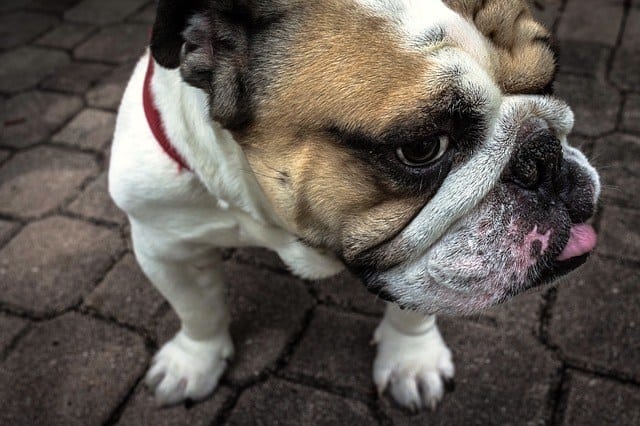
English bulldogs may be cute, but they’re certainly capable of clearing out a room in record time, sending innocent victims fleeing for fresh air. And unfortunately, there are a variety of reasons bulldogs are gassy, so it’s not something that’s easy to address.
For starters, many English bulldogs simply have sensitive systems, which seem to be inherently primed to poot. But another big reason they likely fart so frequently is because they’re a brachycephalic (short-faced) dog breed, who often have eating and breathing difficulties, which likely cause these canines to swallow a lot of air.
2. Boxers

Boxers are notoriously gassy. This is likely related to the fact that boxers are susceptible to a variety of gastrointestinal issues. Many have sensitive stomachs, and the breed appears particularly at risk of suffering from bloat. Boxers are also enthusiastic eaters, which can cause them to swallow a ton of air at chow time.
3. Doberman Pinschers
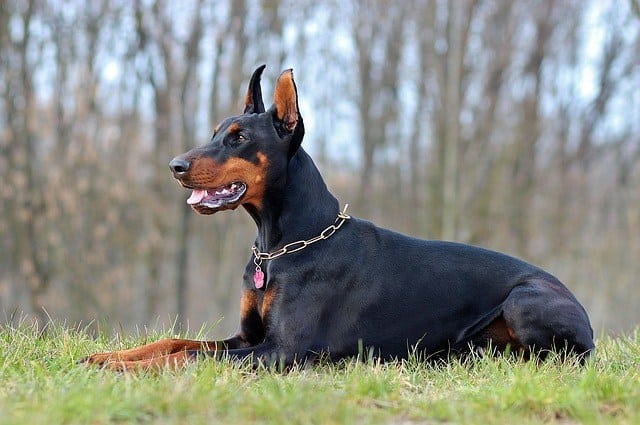
It isn’t clear exactly why Dobermans are so gassy – all their owners know is that these beautiful pups may unleash noxious gasses at any given moment, so it’s always important to remain ready to bolt out of the room. Dobermans are susceptible to bloat, so they may just be predisposed to swallowing a lot of air.
To reduce your chances of being gassed out by a Dobie, make sure to feed your black-and-brown beauty an appropriate Doberman dog food.
4. Golden Retrievers
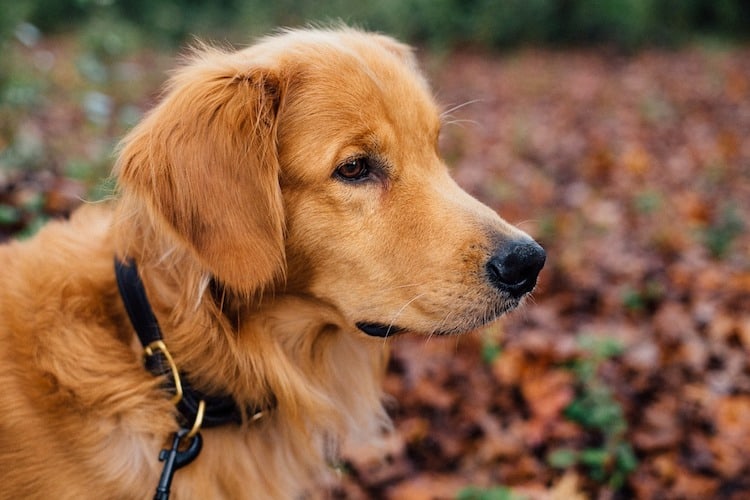
Golden retrievers are another breed with a reputation for being gassy. But there doesn’t appear to be any obvious reason why. Like most other large breeds, they are susceptible to bloat, but that doesn’t seem to explain the issue completely.
Personally, I’m a little curious if this is just an artifact of sampling bias. All dog breeds fart, and golden retrievers are one of the two or three most popular breeds on a year-in, year-out basis.
So, it may just be that there are lots of golden retrievers out there, which just drives up the number who seem gassy.
Still, if you’re choosing a dog food for your golden retriever, it may not be a bad idea to select a lower-fiber or legume-free diet.
5. Pugs
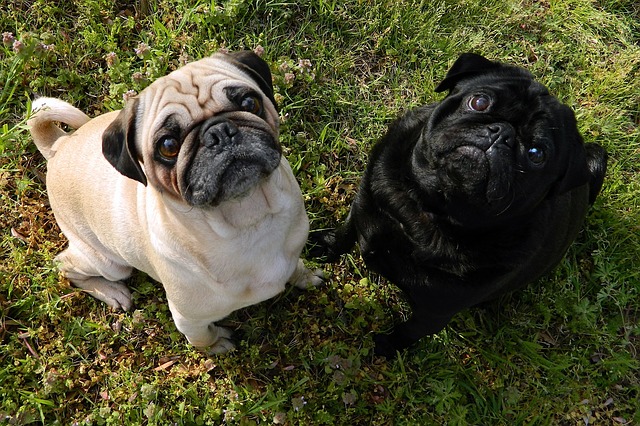
Pugs are certainly adorable little pups, but they can pollute your air space in a way that’d make a big dog jealous.
Pugs are susceptible to a variety of health problems, but relatively few are gastrointestinal in nature. Accordingly, they’re probably considered extra gassy because – like other brachycephalic breeds – they may swallow a lot of air during their daily lives.
It’s also worth considering the fact that because pugs often live up to the lap-dog moniker, their owners are often in the line of fire. In other words, they may not fart more often than the average pooch, but because they are rarely far from your side, you end up taking the brunt of their butt bouquets.
6. Pit Bulls
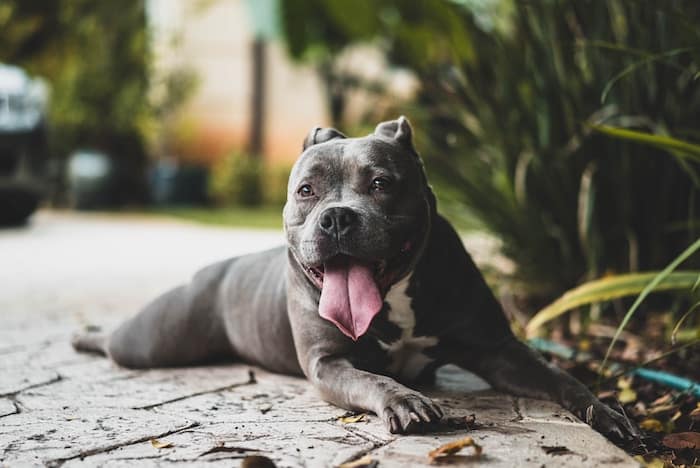
Pit bulls have a lot going for them – they’re sweet, adorable, smart, loyal, and athletic. But they also have a reputation for producing a generous amount of gas.
There aren’t any obvious explanations for the reason pit bulls tend to fart a bunch, but many do have slightly sensitive digestive tracts. This means it may be worth experimenting with different pittie-friendly foods, to find one that limits the gas as much as possible.
7. Beagles

Of course, beagles are gassy – it just seems to fit their rough-and-tumble, ready-to-rock demeanor. They’re also shameless pups, who probably don’t feel bad for blowing you up on a daily basis.
Beagles don’t suffer from many health issues that explain their gassy nature. However, they are mischievous little four-footers, who probably eat things they shouldn’t more often than many other breeds do.
8. Yorkshire Terriers
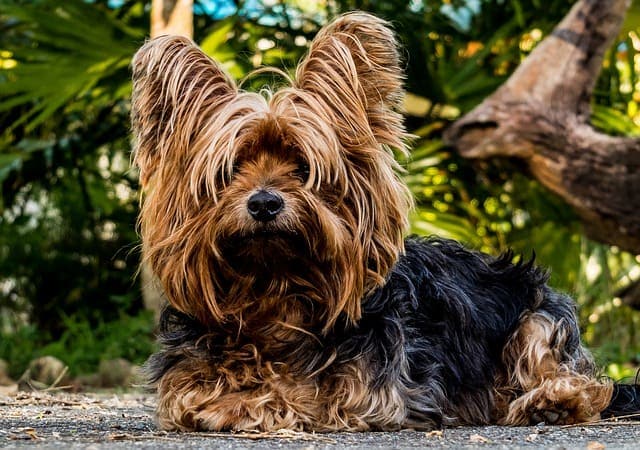
You wouldn’t expect Yorkies to be gassy by looking at them – they are positively dainty dogs, who don’t look capable of unleashing the kind of chemical warfare they sometimes do. But Yorkies are frequent farters, which is probably linked to their tendency to suffer from portosystemic shunts and other associated medical issues that challenge their digestive systems.
It is especially important to avoid giving Yorkies very much people food; aside from helping to reduce the amount of gas they produce, it’ll also help your pet feel better too.
9. Soft Coated Wheaten Terriers
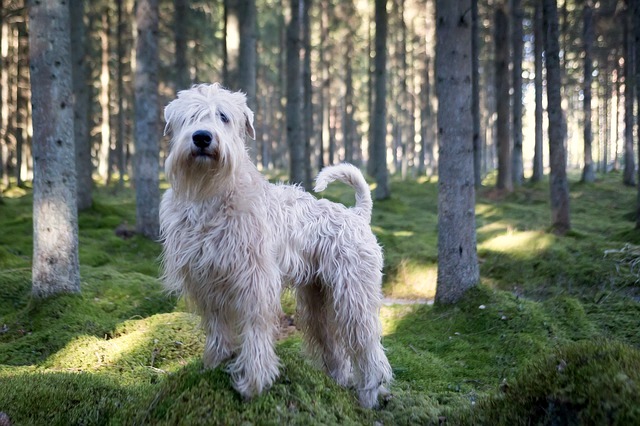
Soft-coated Wheaten terriers frequently appear in discussions of canine gas. Unfortunately, their tendency to produce a lot of gas is likely related to their susceptibility to gastrointestinal disorders, such as protein-losing enteropathy.
In fact, it is probably wise to keep a close eye on your Wheaten terrier’s gassiness and visit the vet if things get out of hand or your pup begins exhibiting any other troubling symptoms.
What Causes Gas in Dogs?
Typically, dog farts are said to occur for one of two reasons:
- Gas is produced by bacteria and other microorganisms breaking down the food in your dog’s intestinal tract. This is normal, and different types of food (and microorganisms) produce different gases. Some — like those rich in methane or sulfur – stink. Others produce gasses rich in carbon dioxide and other largely odorless substances.
- Regular air ends up in your dog’s digestive tract. This usually occurs when dogs swallow air (an occurrence called aerophagia), but there are a few rare health conditions that can also allow air to enter the digestive tract. Eventually, most of this air has to find its way out via one of two available exit points.
These causes aren’t terribly controversial, but it should be noted that at least one nutritionist, Dottie Laflamme, DVM, Ph.D., DACVN with Nestle Purina Pet Care, remains unconvinced that swallowed air contributes to flatulence, citing a lack of published research or evidence. However, she does concede that there is evidence linking swallowed air with bloat.
I haven’t been able to find any other authorities challenging the notion of swallowed air contributing to flatulence. For that matter, plenty of top-tier human medical resources – like the Cleveland Clinic – seem to have no issue with the concept.
But we thought it was worth mentioning.
Danger Signs: Gas Isn’t Always Harmless
Gas is usually not a health concern, but it can be associated with an underlying medical condition. There’s no quick-and-easy way to know without talking to your vet, but there are a few things you’ll want to consider.
For example, dogs who are producing more gas than normal and suffering from other intestinal ailments should probably see a vet. Similarly, dogs who’ve never been very gassy may need veterinary attention if they have bad gas suddenly and start farting left and right for no obvious reason.
Consider your dog’s demeanor too. A dog with standard-issue gas problems probably won’t appear terribly bothered by their farts. On the other hand, a dog with a problem may experience pain or discomfort alongside the gas.
This is simply another occasion in which you’ll need to trust your dog-parent instincts, act in your pet’s best interest, and err on the side of caution. If nothing else, consider contacting the folks at Ask a Vet from JustAnswer – it’s cheaper and easier than taking your dog in for a checkup.
How to Reduce Gas in Dogs
Assuming that your dog is healthy, and his gas is no cause for concern, you can take a few steps that may help fix the situation. You won’t be able to completely eliminate his gas, but there are a few techniques that may prove helpful.
Consider Changing His Diet
A lot of dogs become gassy because of the ingredients in their diet. We’ll list some of the most common culprits in a minute, but for now, just know that dietary changes are something worth exploring when dealing with a gassy pet.
Be sure you select a dog food designed for sensitive stomachs when making the switch and do so slowly to help your dog’s body adjust to the new food.
Cut Out the Table Scraps
We get it – sometimes your pooch deserves some delicious human food. We generally try to explain that while this isn’t a fabulous idea, it’s not the end of the world if you stick to dog-safe foods and keep the quantities minimal.
That said, a lot of human foods can trigger gas in dogs, so you’ll want to cut out the human foods (to the extent that you can resist) until you can identify which foods are causing the problems.
Provide More Exercise
Getting your pup active will help keep his intestines operating well, and it’ll help encourage him to poop more. This will often help reduce the amount of gas he produces, but even if it doesn’t, it’ll help expel a lot of the gas while you’re outside.
It’s all about the small victories.
Slow Down the Eating Process
Eating too quickly is one of the primary ways by which dogs are thought to swallow air. So, it’s a good idea to try to slow down the process as best you can.
If your dog is anxious at feeding time because of behavioral or social issues, you’ll want to work to dissolve any tension and address the root cause of the problem with your vet, a canine behaviorist or trainer. It may even be possible to help your pet chill out at chow time by feeding him in a different place than your other dogs – perceived competition can cause dogs to wolf down their food.
You can also purchase slow feed dog bowls which make it challenging for your dog to slurp up his kibble.
Can Gas-X Help a Gassy Dog?
You can give Gas-X to some dogs, but it can be deadly for others – so you should always call your vet before giving your dog any medication.
But that’s kinda beside the point anyway: Gax-X (simethicone) works by making it easier to expel gas; it won’t do a darn thing to eliminate the gas. In fact, Gas-X is actually one of the first things dogs suffering from bloat are often told to do by their vet.
We’ve written about Gas-X in detail before, so check out that article if you’d like to learn more. But unfortunately, Gas-X is not a solution for your farting four-footer.
Foods That Commonly Cause Gas in Dogs
To an extent, gassiness is a personal issue for dogs. Different individuals simply have different reactions to various foods and ingredients.
But there are a handful of things that are commonly associated with increased gas production:
- Milk
- Red meat
- Beans
- “Cat treats” (You know what I mean)
- High-fiber foods
- Most carbohydrates (aside from rice)
- Fermentable fibers, such as chicory, inulin, psyllium, oats, barley, beet pulp, and fruit
***
Dealing with stinky dog farts is just part of the gig for dog owners. But on balance, I’m sure we’re all willing to put up with poisonous air every once in a while to enjoy all the awesome stuff our floofs do.
Just remember that while gas is usually no cause for concern, you should always consult your vet if your dog’s gas problem presents any of the red flags mentioned above.
Let us know what breed your dog is and rate his fart-factor in the comments below. It’ll be interesting to see if our readers’ experiences align with the reputations of the breeds we list above.
Thankfully, my Rottie isn’t particularly gassy, but when she does decide to depressurize, the results can be deadly. And, as I’ve explained before, hers are normally loud, which helps provide me with some warning.
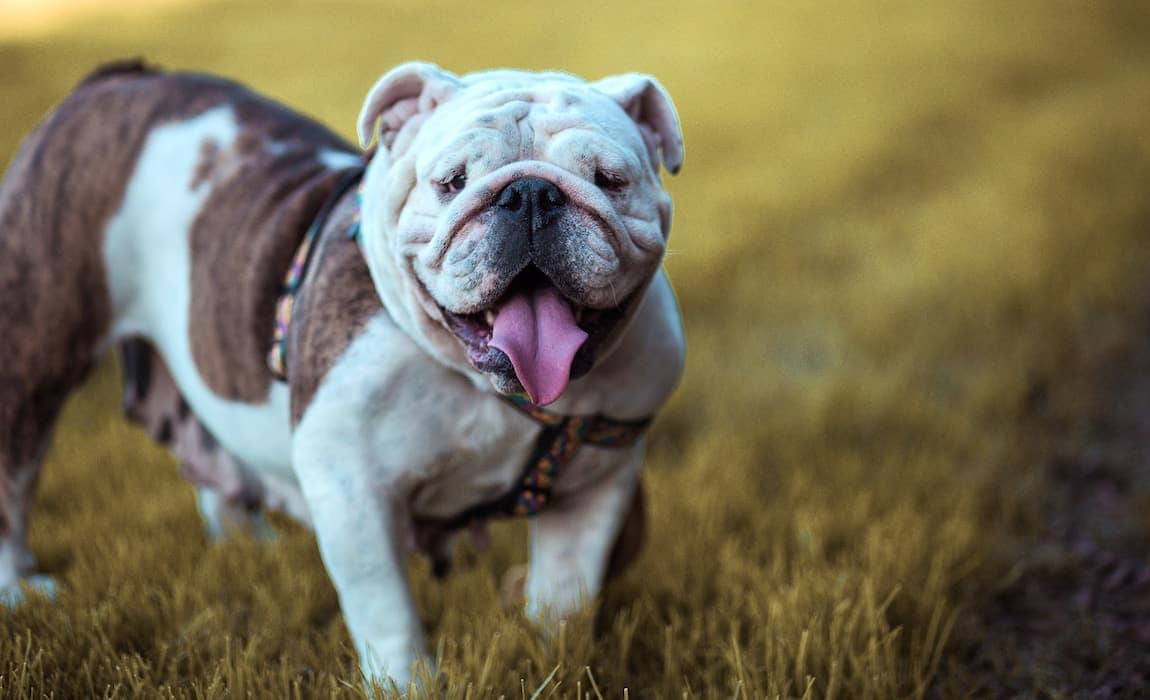
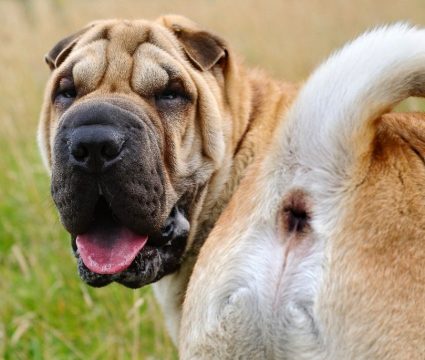



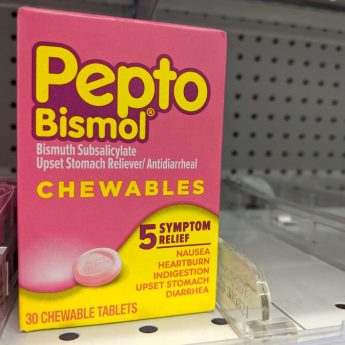


21 Comments
January 22, 2023
I have a 2 year old Pitbull Zoey, Panther (she’s all black with white paws) . Her farts are silent and deadly! I’m going to look into a slower food bowl and slowly changing her diet. Can anyone recommend a good brand of food for her, and possibly the rest of my crew along with Zoey, I have a 3 year old Pomski ( Cooper Bentley ), 6 month Pitski, Coopers son (bleu Ice) He’s blue and white everyone wants him when we go out. and 6 month old dox mix (shadow). Zoey tends to eat fast, I try to feed her separately from others but the toddlers, tend to go after her food.
January 23, 2023
We have the perfect article for you, Tabitha!
Best Foods for Dogs with Gas.
Best of luck!
December 4, 2022
I came across this website while searching for the reason for why my dog farts have become unbearable, and recently my 7 year old Patterdale Terrier Frida, which is a breed known for farting, has been farting none stop, and theyve stunk, I’ve not changed her diet, the only trigger I can think of is she receives table scraps, so that might be the cause, but shes always received scraps, but her farts havent been as bad as they have recently, I’ve bought a slow feeder bowl and made an appointment with my local vet, so when I receive an email from the vets letting me know when an available day for an appointment, hopefully shell try out her slow feeder and hopefully her farts will have gone down 🙂
December 5, 2022
It sounds like you’re taking the right steps, Emma! And yes — table scraps can absolutely make dogs gassy.
Best of luck!
August 23, 2022
We are lucky here. We have a beautiful 2 yr old female lab, who on occasion does fart. Hers are usually loud. Blue who’s 4 months old and our second American Bulldog has the most horrendous gas ever. He clears the room. Bella, the lab, the 2 cats, my son and I will all leave the room. I’m careful with his diet, have a slow feed bowl, no lactose. After our first American Bulldog Kingsley, who suffered horribly from food allergies, also skin rashes, flea allergy. It was a nightmare sometimes for him. I’m trying to put forward all I learned from him into raising Blue in a healthy loving home. So far, so good. Blue did come to us at 3 days old, after his momma abondond him and siblings. We bottle fed him and our lab helped raise him into a happy healthy young fella.
August 23, 2022
Thanks for sharing, Lori! Best of luck. 🙂
February 25, 2022
I have a lab/wiemaranier mix and his farts are awful!! Maybe I should try the paw-pourri! LOL thanks
February 25, 2022
Lol! Good luck with that, Teresa! Let us know if it works out.
October 22, 2021
Mix of Boxer & Pitbull – Believe they are now called BullBoxers as they have been puppy-milled to popularity? In any case since day I got her from a rescue she has had gas to bring tears to your eyes. Sometimes ever she’ll be sick of it and leave the room but of course that’s after the lingering stench is omnipresent. I’ve tried changing diets and adding probiotics to diet. She’s on a mix of dry and canned food but I’ll try making the meal 2 times per day instead of one and adding some ginger & peppermint to it. I have 4 other dogs on the exact same diet but nothing close to this very loved stinky girl…granted the other 4 are very different breeds not prone to as much gas as this very informative article has let me know. They are Yellow Lab mix, Australian Shepard, Lhasa Apso, and Chawini (Dachshund and Chihuahua mixed) breeds. OMG, she was under my computer and let one rip just now…got to leave the room. Guess I wrote enough…..oh the humanity 😛
October 25, 2021
Hey there, Tom.
It’d probably be a good idea to discuss the issue with your vet if your pooch’s gas is really frequent or over-the-top bad.
It may very well just be a byproduct of her individual biology, but it could also signify a health problem.
Best of luck!
July 19, 2021
Revolting
That puts an end to having a dog
June 16, 2021
I have an American bulldog, she constantly farts and honestly….
She could bring tears to a glass eye !
September 17, 2021
Hey Nicola,
Have you looked into Paw-Pourri? Looks like a simple dog treat that makes dog’s farts not stink! Not sure if it works, but it’s a game changer if it’s for real. lol http://www.sneakasqueak.com/products/paw-pourri
November 28, 2020
I looked up this article because we recently took in a six-month-old boxer pup who was stray and never claimed and she has horrible horrible farts. We free feed and she eats a little tiny bit at a time and she’s very very active so I guess we’ll have to change food, which sucks because we have four other dogs.
November 30, 2020
Hey, Lorie. Sorry about youg gassy gal!
Just be sure to speak with your vet before making a food switch — especially since you have several other pups, who may also be affected by the change.
Best of luck!
May 19, 2020
I have a Rottie and she is killing me!
Her gas should have a security level It is so deadly! Plus, it is silent…so no warning. I recently started switching to adding boiled chicken or beef to her kibble and I think this new meat additive is the culprit…any tips on how to deal with this? Anyone tried yogurt?
May 20, 2020
Hey, Marci.
You may want to try probiotics. They’re certainly not guaranteed to help, but it’s a high-upside/low-downside proposition.
December 3, 2019
I have a 4 month old pitbull she is gassy but from what I just read I no what it is she gulps her food so fast she always gets hiccups too. Guess I’m going to slow down her eating. Thank you.
December 3, 2019
Glad to help, Melissa! Be sure to check out our article about slow feeders. They may help slow your pooch down at chow time!
October 24, 2019
Mix of R Ridgeback, Bluetick Coonhound, White Swiss Shepherd. VERY stinky gas and often. Rescue pup, shelter nursed through parvo. Stubborn, affectionate and adorable.
October 24, 2019
What a neat mix!